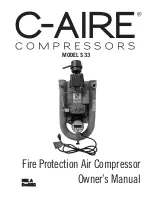
www.fubag.ru
O
m
perator's
anual
- 8 -
4. Maintenance
-
-
.
-
-
.
- R
.
-
must be disposed of
The service life of the machine depends on maintenance quality.
BEFORE CARRYING OUT ANY OPERATION, ALWAYS PULL OUT THE PLUG AND DRAIN THE
RECEIVER COMPLETELY (fig 10-11)
Tighten the tie-bolts of the head at start-up and after the first hour of work (torque 10 Nm = 1.02
Kgm).
After loosening any safety screws (fig. 12a), clean the intake filter according to the type of working
environment and at least every 100 hours (fig 12b-12c). If necessary, replace the filter element
(clogging of the filter reduces compressor performance and an inefficient filter causes increased
wear).
eplace the oil after the first 100 hours of operation and every 300 hours subsequently (fig 13a-
13b-13c). Remember to check the oil level at regular intervals.
Periodically (or after working with the compressor for more than an hour), drain the condensate
that forms inside the receiver (fig. 11) due to the humidity in the air. This protects the receiver from
corrosion and does not restrict its capacity.
* Spent oil and condensate
in compliance with protection of the environment
and current legislation.
-
-
9a-9b-9c-9d
-
-
10-11
The compressor continues to operate automatically with this work cycle until the position of the
switch of the pressure switchis modified. To use the compressor again, wait at least 10 seconds
after this has been switched off before restarting.
Air pressure can be regulated in order to optimize use of air-powered tools operating on the knob
with the valve open (pulling it up and turning it in a clockwise direction to increase pressure and
counterclockwise to reduce this) (fig.
). Once you have set the value required, push the
knob down to lock it.
Please check that the air consumption and the maximum working pressure of the pneumatic tool to
be used are compatible with the pressure set on the pressure regulator and with the amount of air
supplied by the compressor.
When you have finished working, stop the machine, pull out the plug and empty the reservoir (fig.
).

































